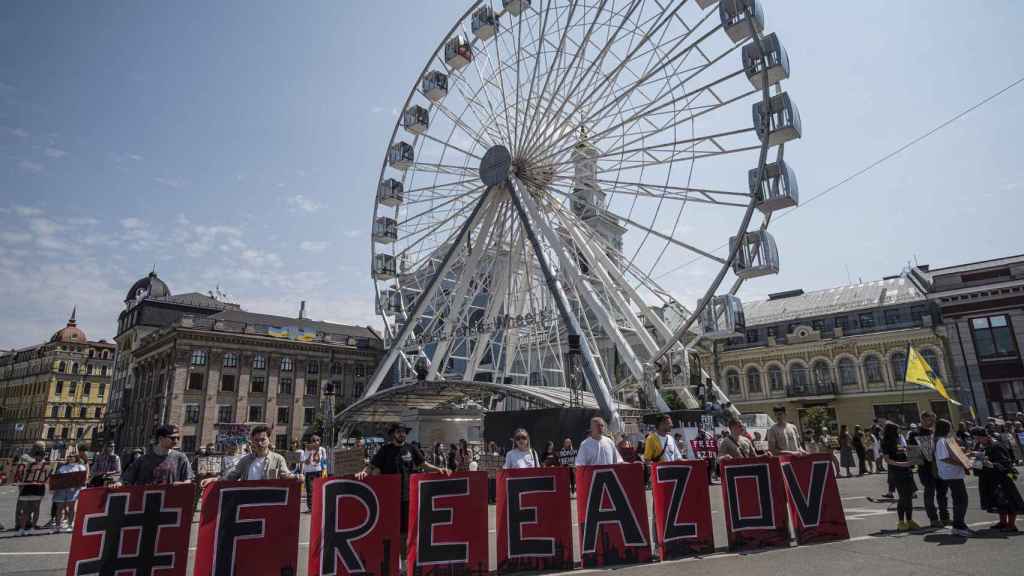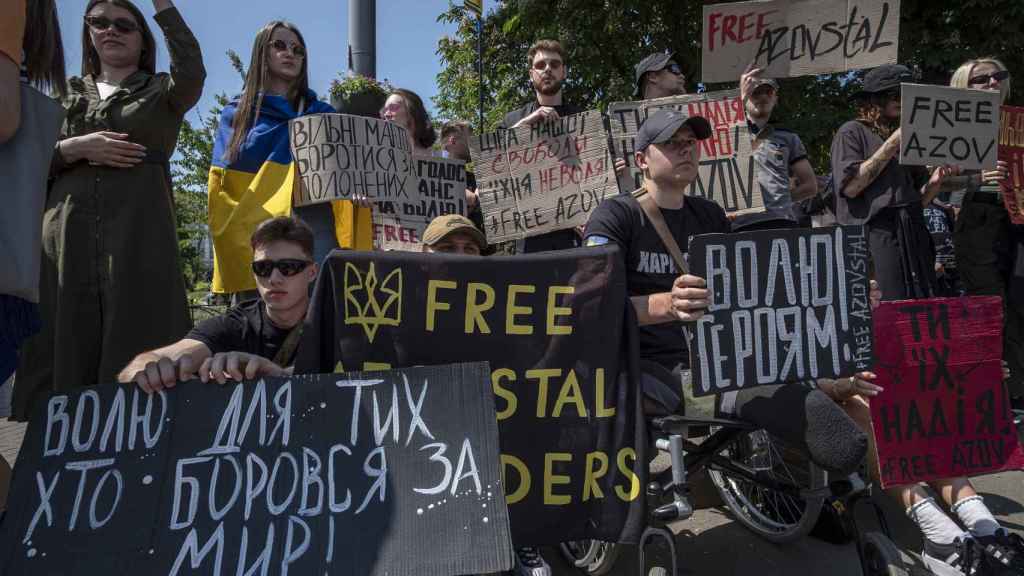“The little food they gave us was served boiling and they told us: ‘You have 30 seconds to swallow it,’ so we burned our mouths and stomachs if we wanted to eat something,” he says. Victor, a former prisoner of Azovstal who spent 13 months in captivity. He speaks with EL ESPAÑOL in the middle of the massive demonstration that took place this Sunday in kyiv – and in the rest of the cities of Ukraine – to demand the release of the more than 1,600 prisoners of war that are in the hands of Russia at the moment.
When it starts to recount the torture to which he was subjected, your blood runs cold. Victor was not even a military man when the full-scale war began; He was only 24 years old, but he did not hesitate to board one of the helicopters that brought aid to Mariupol – in a series of almost suicidal operations – when Russian troops laid siege to Ukrainian fighters at the Azovstal steel plant.
Was seven aid flights, with 73 people on board willing to die to help the defenders of Mariupol. And in fact, some died. They carried medicine, food, ammunition and drones; and they returned loaded with wounded. Victor got on the last of those helicopters, the one that could no longer return, because the Russian troops began to shoot down these flights in which they evacuated the wounded.
[Un comandante de Azov: ‘Dan ganas de abandonar, pero no quieres que tus amigos muriesen por nada’]
Besieged at the Mariupol steelworks, near 2,000 Ukrainian fighters withstood 82 days of brutal siege, with the bulk of the Kremlin’s forces concentrated on them. And this gave the rest of the country an opportunity, a precious time in which they managed to organize the defense of other cities and stop the Russian advance on other combat fronts.
The Government ordered them to surrender on May 17, 2022, given the impossibility of getting them supplies and preserving their lives in some way. “When they gave us the order to surrender it was a very hard moment.”but everyone understood that there was a one in a million chance of survival and that there was nothing else that could be done,” explains Denis, who was also held captive for half a year.
The parade of Ukrainian prisoners was televised – it was also the last time many families saw their loved ones. More than 1,900 fighters boarded Russian buses, with the promise that they would be treated with dignity and their status as prisoners of war – regulated by International Law – would be respected. Nothing could be further from the truth.
The demonstration to demand the freedom of the Azovstal prisoners gathered more than 1,500 people in kyiv.
“When we got on the bus and it started, we believed that at the first stop they were going to get us off to shoot us, and bury us in the quarry towards Volnovakha,” Victor recalls. “We knew it was not going to be as promised when the Russian soldiers The cards that the Red Cross had given us were torn from our hands. to put our personal data; We did not see anyone from the Red Cross again afterwards,” he continues.
300 days of hell
At first they were taken to Olenivka, where they were three months in completely unhygienic conditions: “They didn’t give us drinking water, they took it from a river with a fire truck and put it in barrels for us; They didn’t give us any medicine either, and there were colleagues who died due to lack of medical attention and medicine,” Víctor continues.
“They didn’t even treat us like people, and it wasn’t just because of the continuous beatings they gave us: it was also the psychological harassment, lack of food“, Add. But the worst began later, when they were transferred from the Olenivka prison. Denis was taken to Lugansk – a Ukrainian province that was already completely occupied by Russia – and he only had to resist three more months, because they exchanged him after half a year of captivity.

The meeting to demand the release of Azovstal prisoners was held in all cities of Ukraine.
“I was lucky because I was injured, and they didn’t treat me as badly as those who were fine. They even let me shower once a week. so that the wound would not become infected,” says Denis. “They exchanged me quickly, in addition to because I was injured, because we had many Russian prisoners to exchange,” he says.
However, Victor had worse luck. He was taken to the occupied part of Donetsk, and the welcome he received consisted of about thirty men who tore off his clothes and took turns beating him with sticks for more than half an hour. It was the beginning of a hell that did not decrease in intensity not a single day of the more than 300 that he was there.
“In Olenivka there were Russian guards watching us, but in Horlivka, there were only members of the separatist forces who They tortured us constantly. We were in detention colonies, there were about 200 prisoners per barracks in very bad conditions, and the beatings were constant,” recalls Víctor.

Attendees at the demonstration held in kyiv this Sunday to demand the freedom of the Azovstal prisoners.
“Simply We thought we weren’t going to get out of there alive.: The guards told us that Ukraine had abandoned us, and we had no radio, no newspapers, no internet. It was very distressing not to have any news from out there to know what was happening,” he continues.
“The worst moment was the interrogations. The Investigative Committee of the Russian Federation came and we had to endure the same questions, over and over again, while they hit us very hard; They hit you for a long time, and very hard,” he says with a temper, despite everything.
More Ukrainians than before
“When they trade you, you don’t know it’s a trade. The Russians put a bag over your head and put you on a bus, and the first thing you think is that they are just going to change your neighborhood,” says Denis. “But when you hear Ukrainian spoken, you almost don’t believe it,” Victor interrupts.
“When I got home I was afraid to go to sleep, in case it was a dream and I woke up again in the neighborhood,” he adds. “I was released on June 11, 2023 and it was the happiest moment of my life, the day I was born again,” she acknowledges. But it was not a complete party for either of them: the period of adaptation to “normal life” lasted at least six months, They had nightmares and their physical condition was very bad..
In the photos they show on their phones they look extremely thin, haggard, sick. But despite the harshness of the beatings and torture they received during the eternal months of captivity, Victor and Denis agree that the most difficult thing was to resist psychologicallywondering if his family was okay.
Despite everything, they did not hesitate to return to military service. “A month after returning from captivity, when I was a little more recovered, I told myself ‘the war is not over, The boys are dying, the boys are in captivity’ and I wanted to go back“explains Victor. “At the end of the day, they didn’t break us completely. They made us more nationalistic, yes, and they made us feel proud to be Ukrainians.”
“And we must not confuse the terms nationalist and fascist,” Denis emphasizes, “we sWe are patriots, we love our country and our nationality”. “Now we feel good, we managed to adapt during captivity and we will also adapt to normal life,” she says.
“After passing through Mariupol and captivity, you start to appreciate all the little things in life, you appreciate even the smallest things, like being able to have a coffee,” adds Víctor. “You were in a cage, and when you come out of the cage you feel ten times better.”
They don’t forget them
While Victor and Denis say goodbye with a smile, the more than 1,500 people who had gathered in the Podil neighborhood – in Kiev – to ask for the freedom of the defenders of Azovstal are dissipating around us. There are still 900 Azov soldiers leftamong the more than 1,600 Ukrainian prisoners, and everyone knows that the Kremlin is especially cruel to them for having become a symbol of the Ukrainian resistance.
He range of torture for Azov members is more terrible and violent, and the families of these prisoners know them too. That is why they decided to gather one Sunday last December in the streets of the capital of Ukraine, and many more people joined them, in an act of support and remembrance that has been repeated every Sunday since then.
But this Sunday’s meeting was the largest of those that have been held. Most of the attendees were very very young, and many of them did not even have relatives among the captives. But Support for its defenders was unanimous.
“I don’t have anyone prisoner, but I have them all,” said Yana, a 26-year-old Ukrainian, who remained barefoot and on her knees throughout the meeting, with the phrase Free Azov written on his back. “It is important that they know, at least, that we never forget them and that we have continued fighting in their name,” he adds.
The demonstration was replicated, not only in all the cities of Ukraine, but also in a dozen countries – including Spain – under the motto that Yana had written on her back. And also from a distance, his brothers in arms kept them in mind: “Please, if you go to the demonstration, thank the families in my name. Thank you very much for your husbands, brothers, fathers. What they did two years ago is very great,” read the voice note that reached Telegram. It was sent by a wounded Azov soldier from the hospital where he had just had surgery.














Add Comment